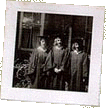Following is a partial list of books, articles and other movies that could be used as supplemental material when using Seven Sisters in the classroom. This is an expanding list, so if you have additions/suggestions, or other creative ways in which you have used Seven Sisters in your classroom, please e-mail them to us.
Cultural Studies, Anthropology, Appalachian Studies, History
Books:
Confronting Appalachian Stereotypes: Back Talk from an American Region, Dwight Billings, Gurney Norman and Katherine Ledford, editors, Kentucky: The University Press of Kentucky, 1999.
A History of Appalachia, by Richard B. Drake, Kentucky: The University Press of Kentucky, 2001.
Hard Times and the New Deal in Kentucky, 1929-1939, by George T. Blakey. Lexington: University of Kentucky Press, 1986.
Articles:
Clifford Gertz ,"Thick Description: Toward an Interpretive Theory of Culture," The Interpretation of Cultures, NY: Basic Books, 1973.
Dwight Billings, Mary Beth Pudup and Altina Waller, Appalachia in the Making: The Mountain South in the 19th Century, Chapel Hill: UNC Press, 1995
Rhoda Halperin, "Appalachian in Cities: Issues and Challenges for Research," From Mountains to Metropolis: Appalachian Migrants in American Cities, Kathryn Borman and Phil Obermiller eds., Westport, CT: Greenwood Publishing Group.
Readings on Music
Kentucky Country: Folk and Country Music of Kentucky, by Charles K. Wolfe, University of Kentucky Press, 1982.
In the Country of Country: A Journey to the Roots of American Music, by Nicholas Dawidoff, Vintage Books, New York, 1997
Other Suggested Films
Stranger with a Camera, directed by Elizabeth Barrett, available at Appalshop (www.appalshop.org). A wonderful film about the complex issues surrounding the portrayal of the Appalachian region.
Strangers& Kin: The History of the Hillbilly Image, directed by Herb E. Smith, available at Appalshop (www.appalshop.org). A great resource exploring the creation of the hillbilly stereotype in literature, television and film.
Troublesome Creek: A Midwestern, directed by Jeanne Jordan and Steven Ascher. A personal journey dealing with the emotional and economic struggle to keep a family farm in the contemporary economy.
|
